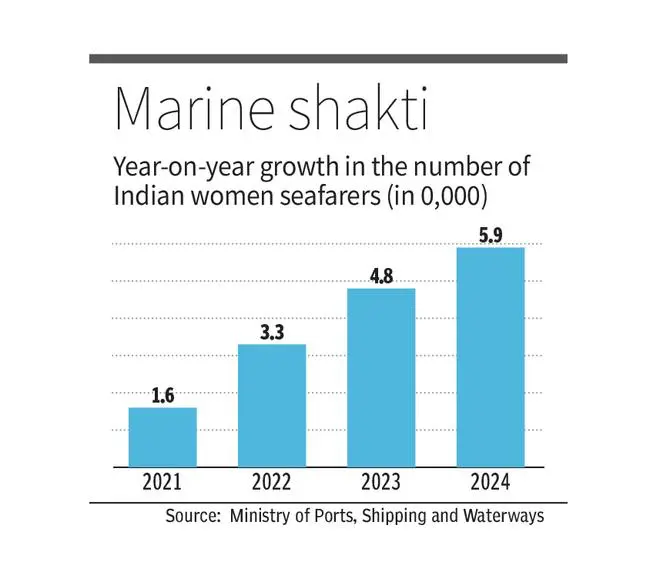Maritime sector’s pioneering Indian women

Meet these illustrious Indian women seafarers who are the country’s first in their respective domains: Suneeti Bala, chief engineer of a merchant vessel; Reshma Nilofer Visalakshi, sole female marine pilot, steering ships from the sea to Kolkata and Haldia port; Sonali Banerjee, marine engineer; Parvathy Rajalakshmi, naval architect; and Radhika Menon, a merchant navy captain.
At the India Maritime Week 2025 held in Mumbai recently, they were felicitated for serving as torch-bearers and inspiring a whole new generation of women to join the maritime workforce.
According to data from the Directorate General of Shipping, in 2021 there were 1,600 Indian women seafarers globally. Their numbers increased to nearly 6,000 by end-2024, thanks to factors such as the Centre’s policy intervention to encourage more women to join the maritime industry, rising awareness of career opportunities in the sector and promotion of diversity aboard global shipping lines.

Data from 2021 to 2024 also indicates a positive trend in the inclusion of female ratings and officers within both nautical and engineering departments.
Scholarships
Notably, there are more women now in technical roles such as electro technical cadet and trainee engine rating, reflecting the maritime sector’s rising openness to recruiting female professionals, says the Directorate General of Shipping, which manages Indian seafarers globally.
Capt Menon says model pioneers have helped spur more women to become seafarers; support from industry and regulatory bodies, policies promoting a conducive on-board atmosphere for women, and scholarships and fee concessions at maritime training institutes are the other positive influences, she says.
An official of a leading maritime institute in Chennai credits the Ministry of Ports, Shipping and Waterways for promoting women’s empowerment in the maritime sector by recognising their valuable contributions. The Ministry plans to institute more scholarships for women cadets. The Maritime Training Trust offers a scholarship of about ₹1 lakh a year to women cadets. All-woman training batches are formed to promote inclusivity and create a support system.
Industry-wide push
Logistics behemoth Maersk’s ‘Equal At Sea’ initiative, launched in 2022, has registered remarkable success in India. The programme’s primary goal is to achieve greater diversity among Maersk seafarers, tackle the historical under-representation of women among seafarers and foster an ecosystem across the Indian maritime sector to improve gender diversity, says Karan Kochhar, Managing Director, Maersk Fleet Management and Technology India, and Head of Marine People Asia, AP Moller–Maersk.
The programme brings together various industry stakeholders on a common platform, acting as a hub for exchanging ideas, understanding industry challenges, learning from each other and adopting best practices, he says.
Other shipping companies like V ships, Synergy, CMA CGM, MSC and OSM Thome, too, are recruiting more women seafarers, says the official of the Chennai maritime institute. Organisations like the Women’s International Shipping & Trading Association and the International Maritime Organisation serve as platforms for women in the maritime sector, promoting diversity and inclusion, and helping break down traditional barriers and stereotypes, he says.
Minor share
Today, nearly 25,000 women are serving as seafarers globally, which is a near 46 per cent increase over the last decade.
And yet, despite these rising numbers, women seafarers constitute a negligible share of the marine workforce. According to the Indian Maritime Organisation, which governs shipping globally, women comprise only 1.2 per cent of the global seafarer workforce.
On the factors still holding back women from venturing into the maritime sector, Shyam Jaganathan, Director General of Shipping, pointed out at the India Maritime Week that statistics clearly show that seafaring is not a gender-equitable workspace currently. Of the 3 lakh Indian seafarers, who form 12 per cent of the global seafaring pool, only 2 per cent are women.
The government’s Sagar Mein Samman (SMS) initiative aims to bolster the participation of women in the maritime industry. This is aligned with its diversity, equity and inclusion (DEI) objectives, says Jaganathan. The Maritime India Vision 2030, likewise, targets uplifting women seafarers and steering India towards maritime excellence, he adds.
Strategies to enhance women’s participation in the sector include the formulation and enforcement of an anti-harassment policy, gender-neutral advocacy in maritime conventions and ‘corporate social responsibility’ mandates for maritime institutions, he says.
Family support
Malini V Shankar, Vice Chancellor, Indian Maritime University, believes that awareness creation by stakeholders, full scholarships for girl cadets and the presence of role models are encouraging more Indian women to become seafarers.
“I find an evolution in the last decade — earlier, young women had to convince their parents, who were not comfortable with daughters going to sea, but now the youngsters do their own research and make a choice and, most importantly, they are supported by their parents, especially their mothers,” she observes.
The diversity policies of global maritime corporates are also enabling placements for women cadets, she says.
“At IMU, we have witnessed a surge in our Kolkata and Chennai campuses. Our ads state explicitly that girls are encouraged to join. We increased the number of women faculty (our ads once again state: ‘women are encouraged to apply’), and that perhaps gives a comfort to aspiring girls,” she adds.
More Like This
Published on November 3, 2025


